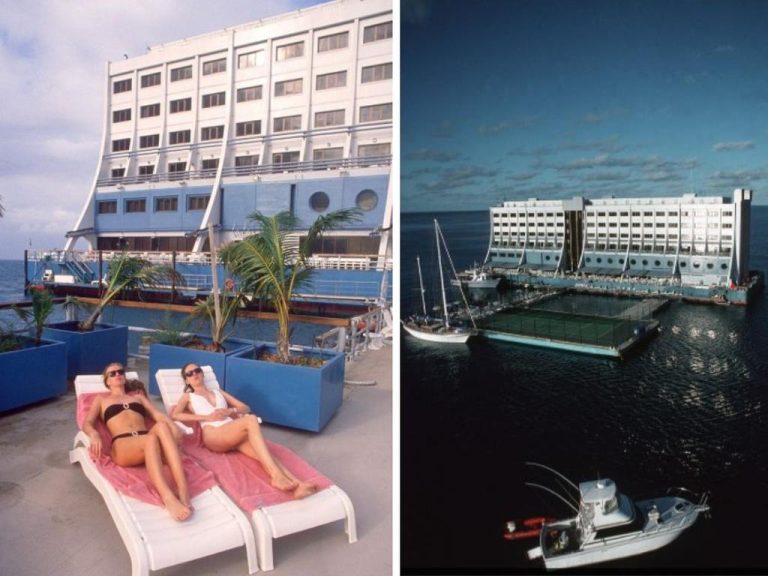London calling: Meet the Aussie entrepreneurs who are conquering the UK
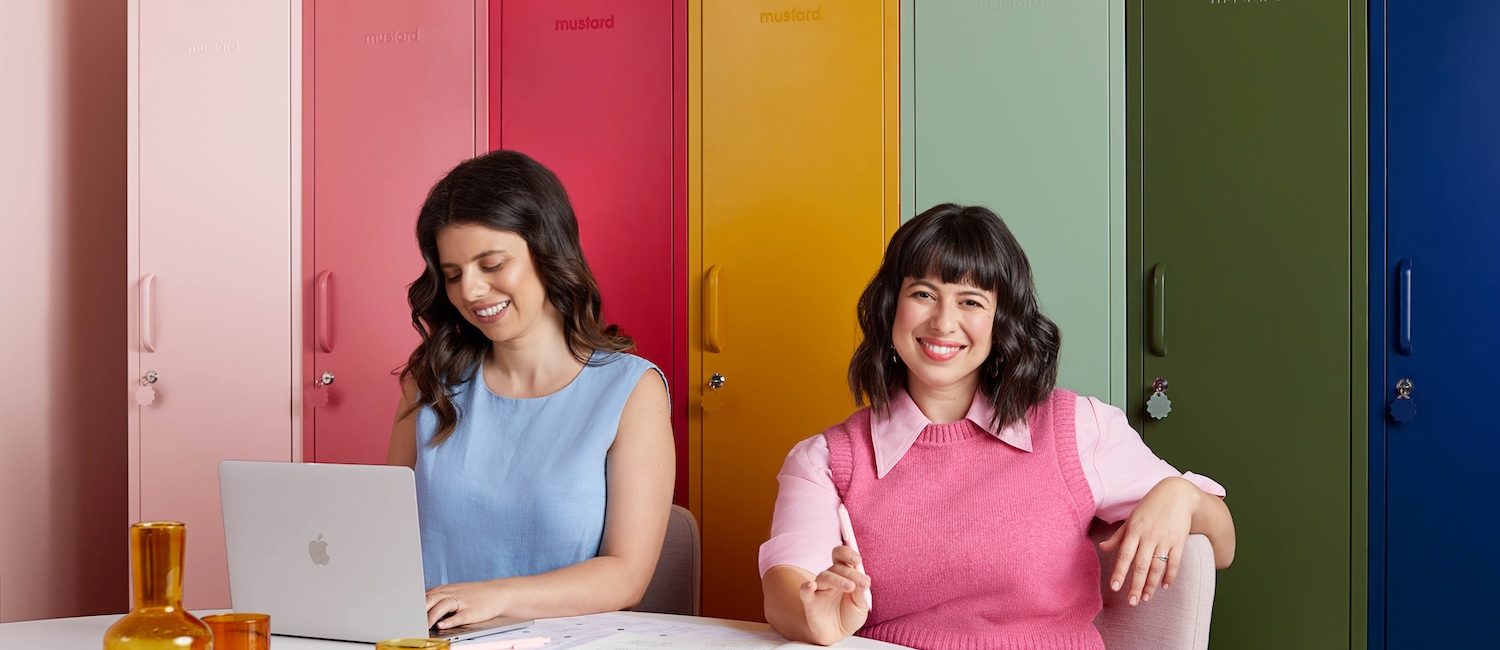
From Michelin-starred restaurants and pioneering bakeries to innovative furniture startups and luxury watch brand showcases, there’s a wave of Aussie-owned businesses making their mark on the iconic streets of London.
But what does it take to succeed in the British capital? To find out we spoke to some of the expat entrepreneurs to get an insight into their journeys — and the hurdles they’ve had to overcome — on their way to success.
Time+Tide Watches
Noting a gap in the luxury watches market was a ‘lightbulb’ moment for Melbourne-based journalist and founder and CEO of Time+Tide Watches, Andrew McUtchen.
“What originally inspired the business was the glaring lack of a professionally produced specialist luxury watch media website,” Mr McUtchen told Realcommercial.com.au. “I was writing about watches for GQ Magazine at the time and I knew that watch brands had digital budget to spend, but nowhere to spend it.”

Former Journalist Andrew McUtcheon leveraged his luxe watch website Timeandtidewatches.com into a physical retail space in London. Picture: Jason Lau Photography
Taking his cue, Andrew speedily launched luxe watch site, Timeandtidewatches.com and soon had four to the world’s top watch brands signed up as founding partners. “Within months we were known as ‘the Australian watch authority’,” he said. And in the intervening decade, the former journalist’s route to high-end watch supremacy took him on a journey that he never expected with the opening of a physical ‘Watch Discovery Studios’ retail store in Melbourne.
“Time+Tide Watches is the only watch media publisher in the world to have a physical retail arm to their business,” he said. “We bridge the gap between internet-famous micro-brands and small independent brands and watch-lovers who want to experience them ‘in the metal’. We aim to harness watch culture to be the biggest alternative watch retailer in the world.”
Though initially opening in central Melbourne, Mr McUtchen knew that expansion overseas was on the cards.
“While the ‘Watch Discovery Studio’ concept worked well in Melbourne, Australia represents only 1% of the Swiss export market for luxury watches,” explained the 48-year-old. “So we wanted to test the idea in a market which is around 14 times bigger.”
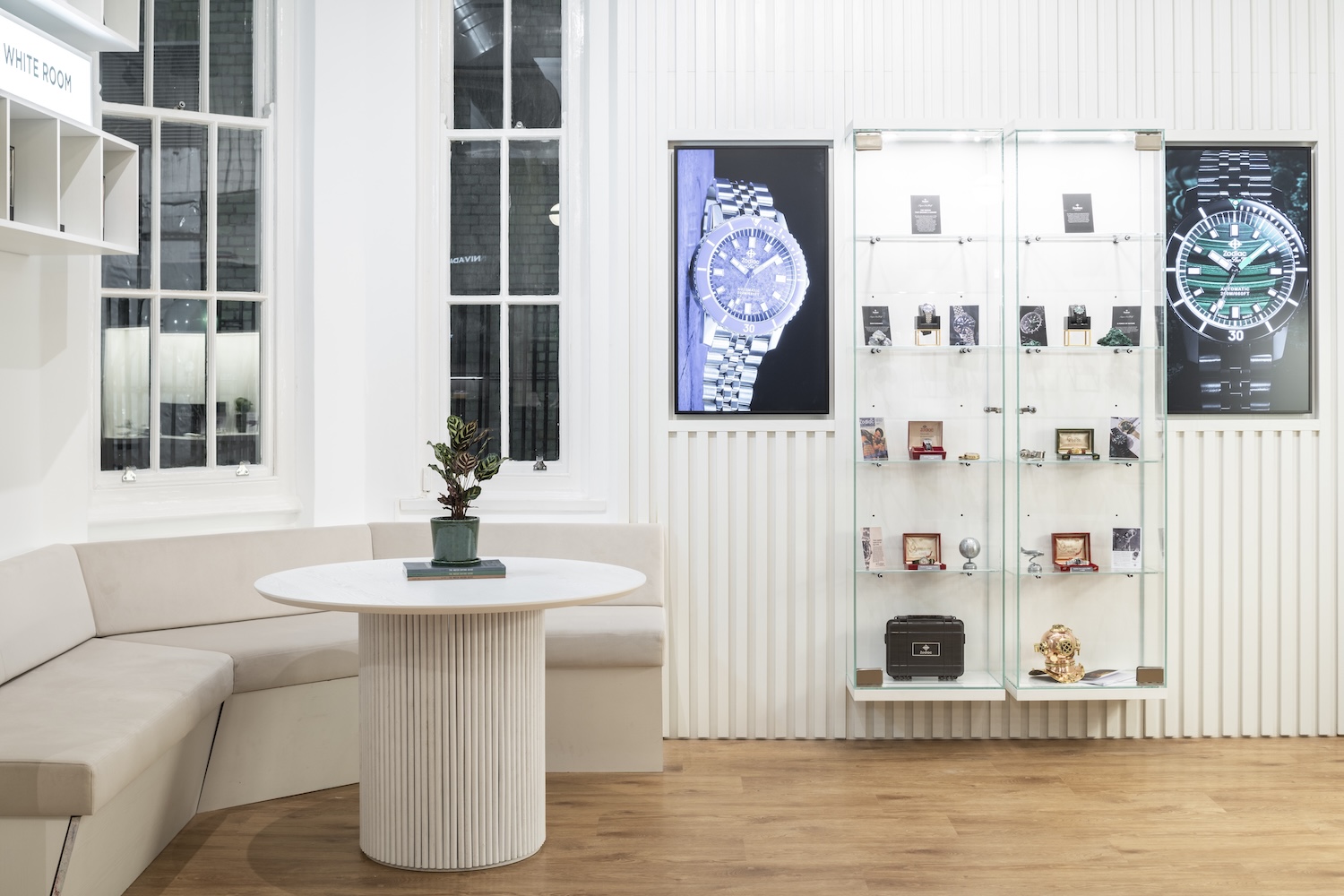
After opening first the first Time+Tide shop in Melbourne, McUtcheon opened a London studio that Esquire Magazine called ‘the best new watch shop in Britain’. Picture: Supplied
Taking a hefty punt, the CEO made the move to London, with his wife and three daughters in tow, and launched a Watch Discovery Studio in the heart of the city. But this gutsy move wasn’t without its hiccups.
“We faced all the challenges and we made all the mistakes,” he said. “From UK taxation, VAT, and commercial real estate quirks (six months rent as a security!), to building a UK-database of customers and followers from the ground up, we had to start all over again in many respects. But I don’t regret moving fast and breaking things. These things can be bent to your will if you push hard enough.”
But the payoff has, according to Mr McUtchen, been more than worth it. “Since we opened we’ve been on a rocket ship that flies past milestones faster than we can keep up!” he enthused. “Before we’d even ticked over two months of trading, Esquire Magazine called us ‘the best new watch shop in Britain.’
“I think part of our success is that we bring a totally different tone to the hitherto snobby and judgmental luxury watch world. Australians are open, direct, and do away with many of the airs and graces. In our retail spaces, we are building a reputation for offering a warm and enabling experience that stands in stark contrast to the frosty reception you might get in a high-end retailer as a new customer.”
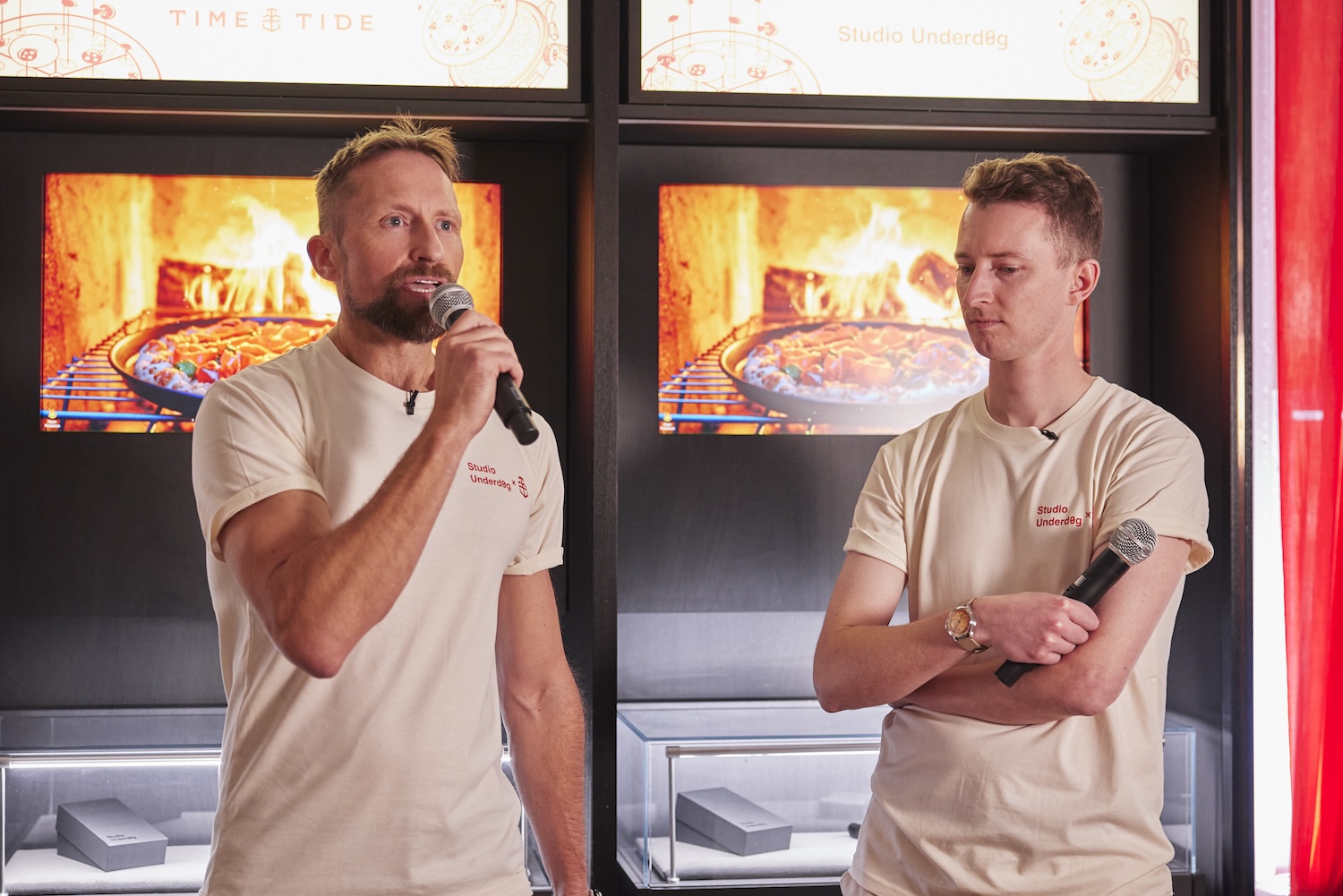
Time+Tide recently collaborated with Studio UnderD0g to create a pizza-inspired watch range. Pictured: Time+Tide founder and CEO Andrew McUtcheon and Studio UnderD0g designer Richard Benc.
Flying high, Mr McUtchen has no regrets about his decision to relocate to the British capital — if anything, he wishes he’d done it sooner.
“I wish I’d had the mettle and the means to do it earlier,” he said. “However learning from our first foray in Melbourne was very useful. Looking ahead, we will soon announce that we are raising money to expand into the USA, a market that is twice the size again of the UK. It is the big game…Melbourne. London. New York. Sounds good!”
Mustard Made
A creative bond between two sisters — one living in Australia and the other in London — was the foundation for an enterprising furniture start-up that now straddles offices in both the UK and Australia.
“My sister Jess and I had talked about starting a business together for years,” said Newcastle-based co-founder and creative director of Mustard Made, Becca Stern. “I had my own handmade jewellery brand, but following the birth of my second son, I made the decision to close the business down. Making every product by hand is difficult with a small baby in your arms, and it’s also not scalable.”

Sisters Jess and Becca Stern founded Mustard Made, a furniture start-up with offices in Australia and the UK that’s expanding to the US and Europe. Picture: Supplied
“Jess came to visit me from London and we went for a walk along the beach here in Newcastle and we talked about our long-held dream of starting a business together. We each felt that our careers weren’t taking us in the direction we wanted to go, but it wasn’t until we started talking about my collection of vintage lockers that the idea really solidified.”
This initial spark became Mustard Made — an online furniture brand that specialises in colourful and stylish storage solutions, including a range of customisable lockers, cabinets, and other pieces.
“We launched at a trade show in Sydney in 2018 and the response to our products exceeded our wildest dreams,” said Miss Stern. “That prompted us to think bigger, sooner, and we quickly expanded to the UK. Plus, with Jess based in London, it was really a natural evolution for us to move into the UK.”
Operating in two different markets simultaneously represented different challenges to the sibling start-up.
“Geographically, the UK is very different to Australia, so things like shipping and logistics come with a whole range of new complications and things to get your head around,” she said. “Australia and the UK also have a very different aesthetic when it comes to people’s homes, so we had to adjust our buying to reflect the different preferences for the market.”
“Similarly, we’ve had to consider the difference in season from one hemisphere to the other. A story about a spring refresh here, doesn’t work when they are going into autumn/winter. Even Christmas content even looks really different, so we’re constantly trying to find a way to speak to our different audiences in a way that resonates. It’s an ongoing challenge!”
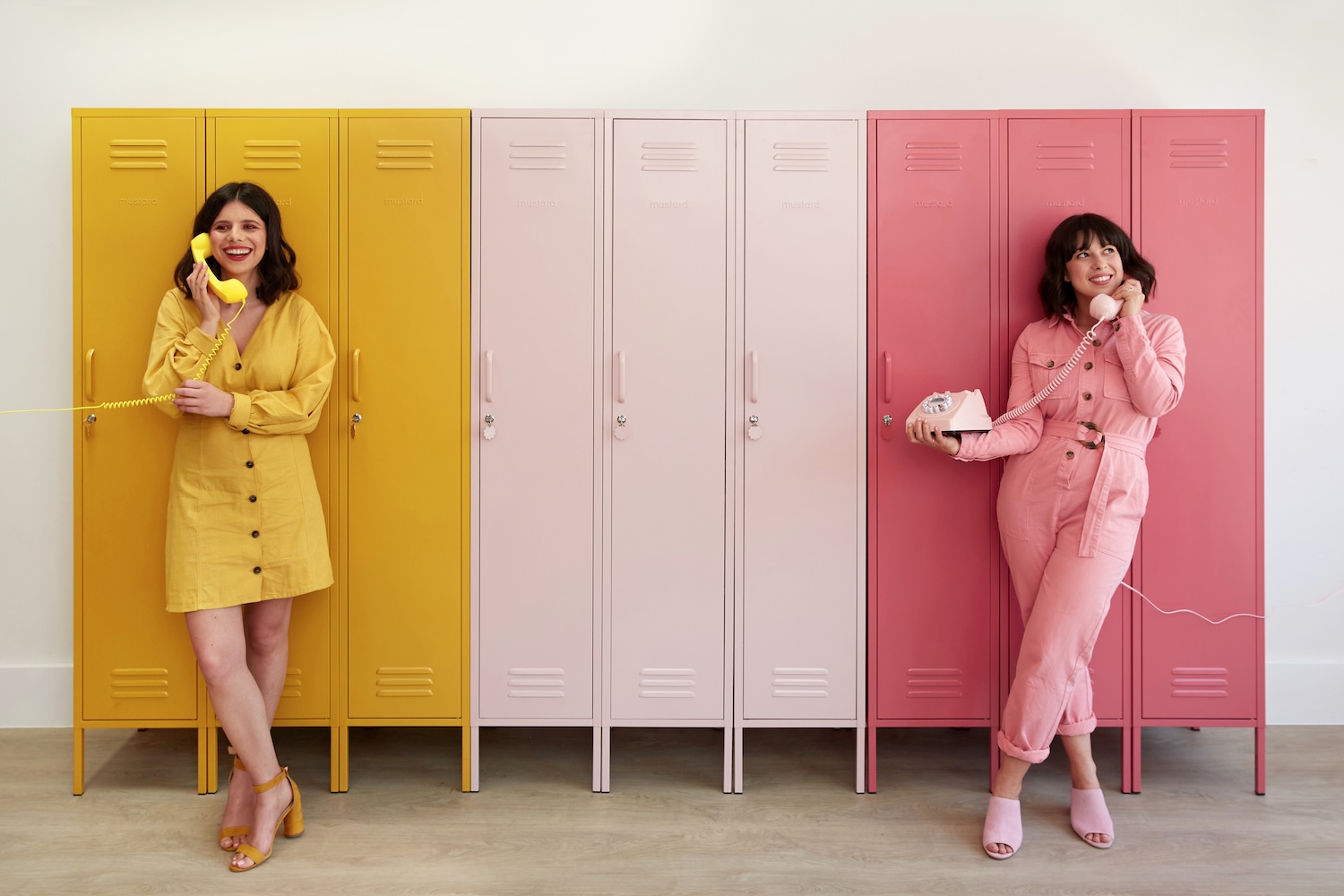
Mustard Made’s brightly coloured lockers have been seen in the homes of celebrities across the globe. Picture: Supplied
While juggling multiple regions adds complexity and requires more thought across all areas of the business, in the almost seven years since they launched, Mustard Made, has grown from only Becca and her sister, to a team of over 30, spread across two offices in Newcastle and London.
“We have expanded into the US and European markets too and grown our product range in a rainbow of colours,” she enthused. “We’ve had some very exciting moments, like seeing our lockers in the homes of Paris Hilton, Celeste Barber and Amanda Seyfried and receiving an order from Justin Bieber!”
“Even when there were bumps in the road, it taught us so much and we wouldn’t be where we are today without having been through that journey. We’ve weathered COVID, a global shipping crisis and economic turbulence, it’s not for the fainthearted. I’ve lost a lot of sleep over the years, but I’m really proud of what we’ve achieved. And there is so much more still to come!”
Lockdown Bakehouse
After a four-year chef apprenticeship in his native Tasmania, Chris Brumby, set his sights on the UK and on crafting Michelin-starred pastries. But the ensuing false starts and wrong turns turned out to be a blessing, rather than a curse.
“Though I wanted to work in Michelin-starred pastries it never happened,” he told Realcommercial.com.au. “I took on a role in a pub — which ended up winning ‘best pub in Britain’ in 2007 — and then ran a brunch place in Clapham, before buying a food truck on a credit card!”
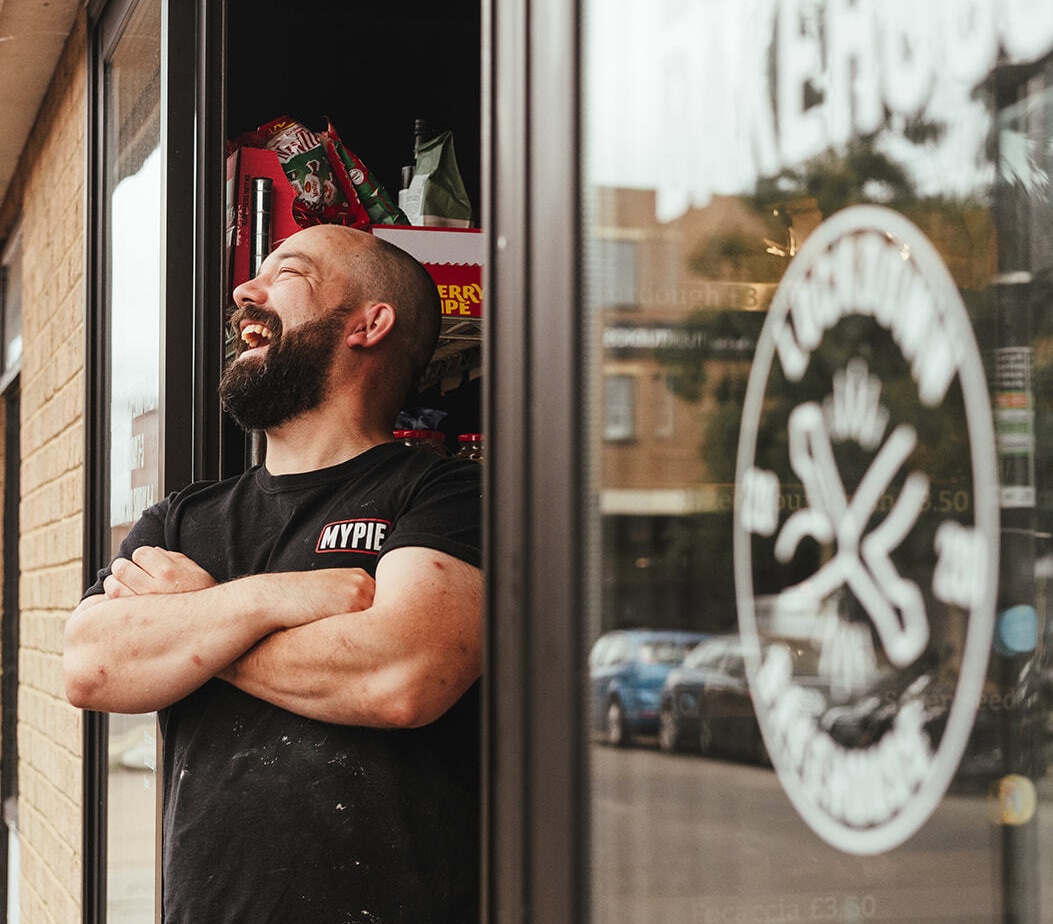
Aptly named Lockdown Bakehouse launched during the pandemic, and now employs more than 100 people across four cafes, food trucks and a production bakery. Picture: Supplied
Among the innovators at a market in London, Chris found himself rapidly in demand for festivals all over the city and the south east region. But his success was almost short-lived with the arrival of the pandemic.
“We sat with our team and tried to work out what to do to keep them employed,” he said. What emerged was the Lockdown Bakehouse. Aptly named, the bakery found its footing during the days of social distancing and quickly gained a following for its delicious bread, pastries, and coffee.
“I took a government grant and used it to pay for staff and development of products,” he explained. “I played around baking bread, taught myself how to laminate, making pastries from watching YouTube videos on repeat and someone asked us to supply their cafes when takeaways were permitted.”
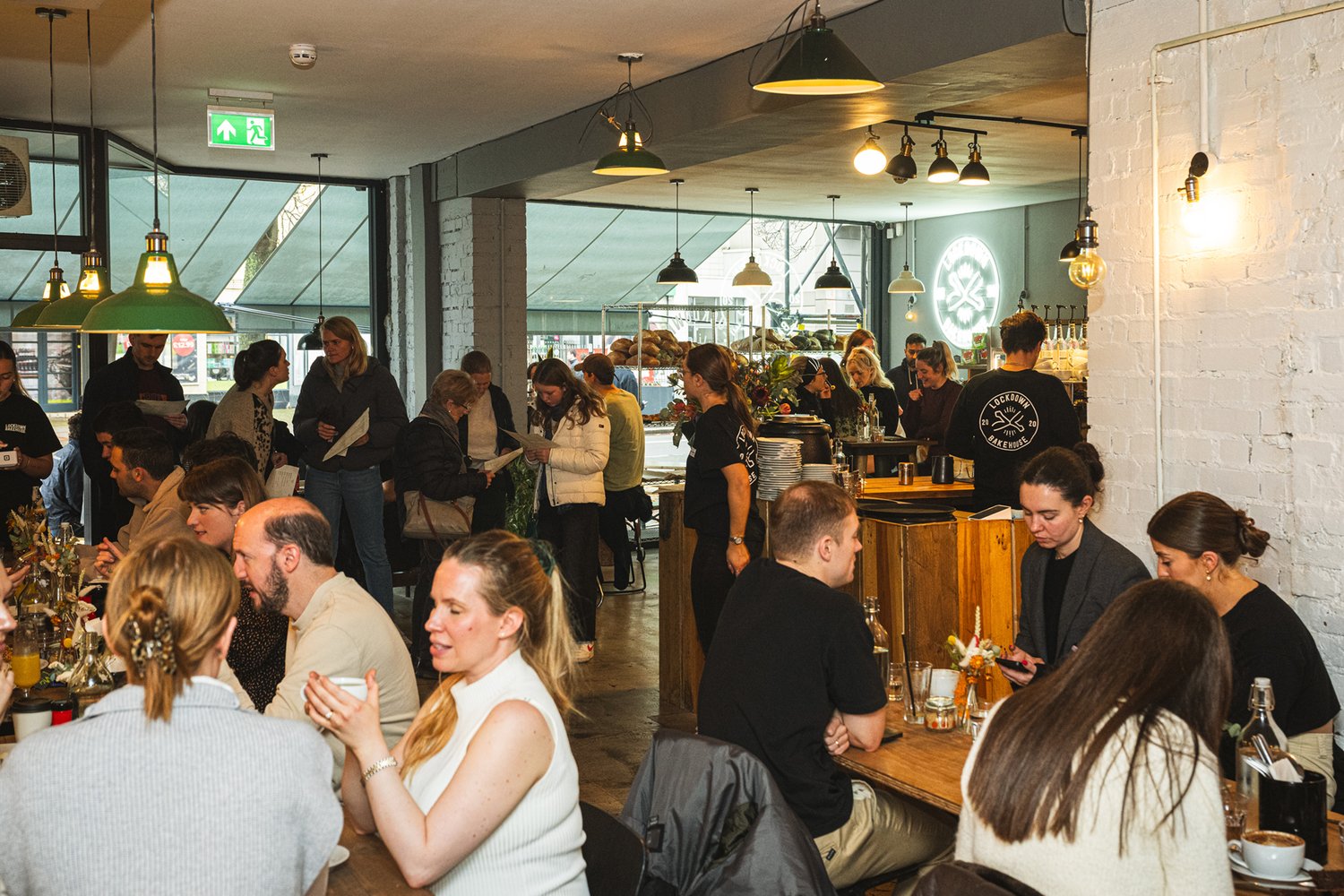
Lockdown Bakehouse now has four permanent cafes in Wandsworth, Barnes, Earlsfield and Clapham (pictured). Picture: Chris Coulson
The DIY approach clearly worked for Chris and his pivoting crew. In the four short years that followed Lockdown Bakehouse now has four permanent cafes, food trucks, a huge production bakery and a staff of than 100.
“The success we’ve had might not have been achieved in Australis as the concentration of people doesn’t exist,” said Chris of his unexpected business empire. “For now, we’re looking at more stores locally, but we have to beware of the huge tax changes this year — business rate and national insurance have all increased, which will cost us £120,000 from the bottom line in year one alone. We’ll likely shift focus on making more, for less.”
Step One
The path to success wasn’t without its ups and downs for Sydney-born, Greg Taylor, the founder of cult underwear brand Step One Limited.
Having previously overseen seven different businesses over 12 years, since leaving a promising rowing career (Mr Taylor won three titles at the Australian Junior Rowing Championships), the entrepreneur finally struck gold with his idea for a game-changing underwear design.
“The idea for Step One came about while I was on a multi-day hiking holiday with my wife in New Zealand,” he told Realcommercial.com.au. “Like most guys, my legs rub together, causing chafing, sweat and constant adjustment of my underwear — sometimes it would get so bad, it would cause the skin to break and would bleed.”
“I thought: ‘there must be a product on the market that prevents, chafing, sweaty bits and doesn’t ride up all the time’ but then I looked online and no such thing existed.”
Enter Step One. Designed to bring innovation to men’s underwear, the range is also great for active types thanks to its bamboo fabric construction, which is naturally moisture-wicking and breathable. Since its formation, it has expanded to include a full women’s range and a newly released juniors range.
After quickly storming the Australian market, Greg began to see the potential in expanding overseas.
“We had a lot of customers from the US and UK buying from us in Australia, so we decided to set up an office in London,” he said. “It’s easier to grow your business and brand awareness when you have people who can promote the product and proactively leverage local events and trends.”
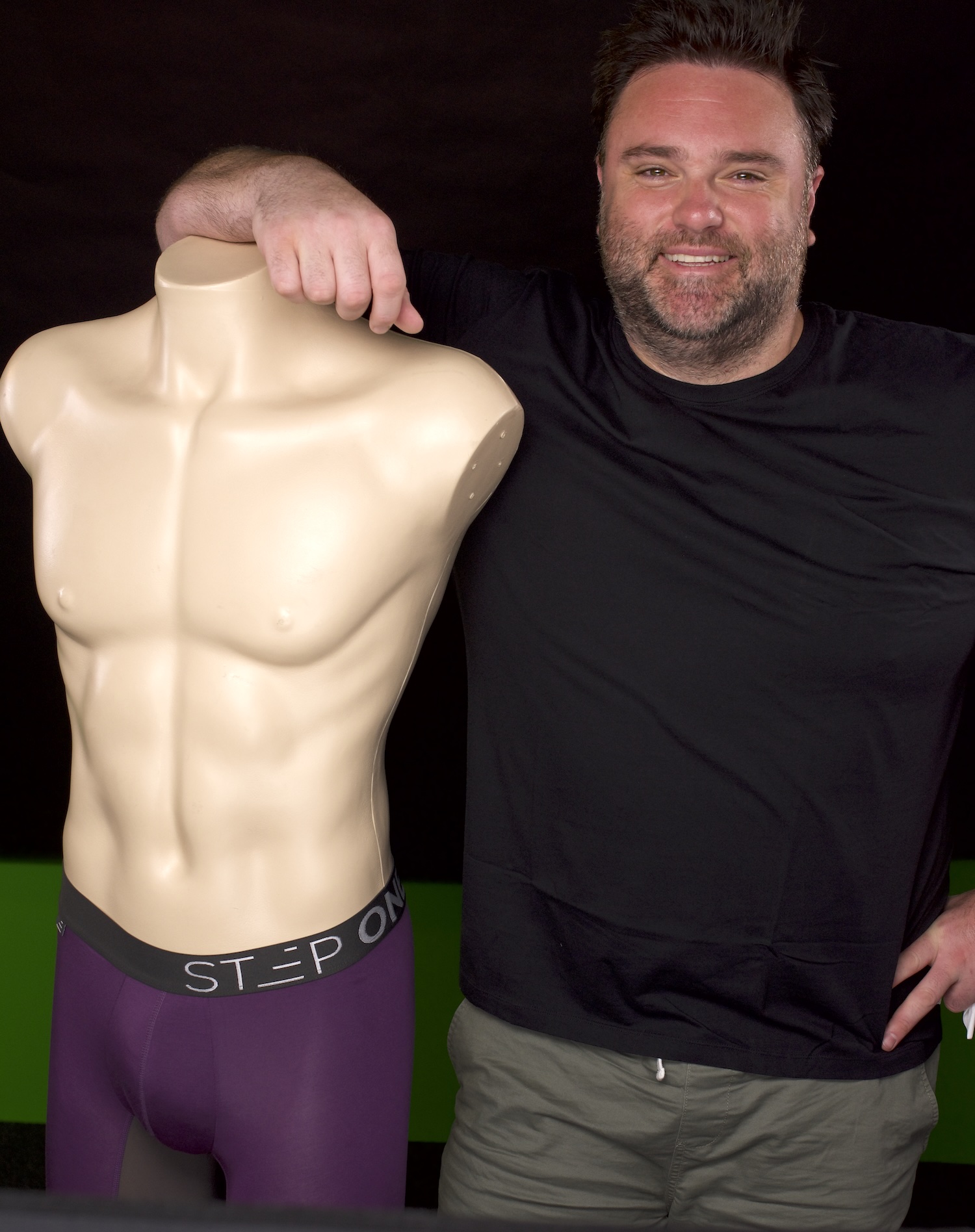
Sydney-born Greg Taylor expanded his underwear brand Step One to London to cater to their growing customer base in the UK. Picture: Supplied
In a few years Step One has seen strong growth in the UK market (“more than 30%”, said Mr Taylor) and the brand has also landed a landmark online deal with John Lewis — the largest department retailer in the UK.
But while the rewards and coming thick and fast now, Greg said that there were challenges he faced in the early stages as a non-native business owner.
“It’s such a simple thing but in the UK they call underwear ‘pants’ and it took me awhile to work this out!” he said. “I kept talking about not wearing ‘pants’ meaning trousers, they thought I was going commando! There are quite a few local words and phrases that I’d never heard of and it’s also important to make sure your tone of voice is right for the market and customer you are targeting.”
“The other challenge is navigating the different legal and regulatory requirements in each country particularly for a business that is predominately online with limited physical presence in some countries.”
Now, four years on from opening, the 43-year-old has no regrets about his UK expansion. “No regrets at all,” he said. “Expanding to the UK has been great for our bottom line. We are working to continue our growth and brand awareness in the UK market, we are also doing some preliminary testing in some other European markets — people often forget that across the English channel there’s a market of over 250 million people!”
The Ledbury
Regularly hailed as one of the UK’s best eateries and even earning a place on the coveted ’World’s Best 50 Restaurants’ list, The Ledbury is, after two decades, one of England’s greatest fine dining institutions. But it may come as some surprise that the mastermind behind the gourmand stalwart is, in fact. Australian.
“Prior to coming to England I was working at Banc Restaurant in Sydney’s Martin Place,” said Newcastle-born head chef and proprietor, Brett Graham. “I won the Josephine Pignolet award, which allowed to a trip to London to work. I worked at The Square initially, then opened The Ledbury back in 2005.”
Located in trendy Notting Hill, the renowned Michelin-starred restaurant is celebrated for its innovative and refined modern European cuisine, showcasing seasonal British ingredients with Japanese influences.
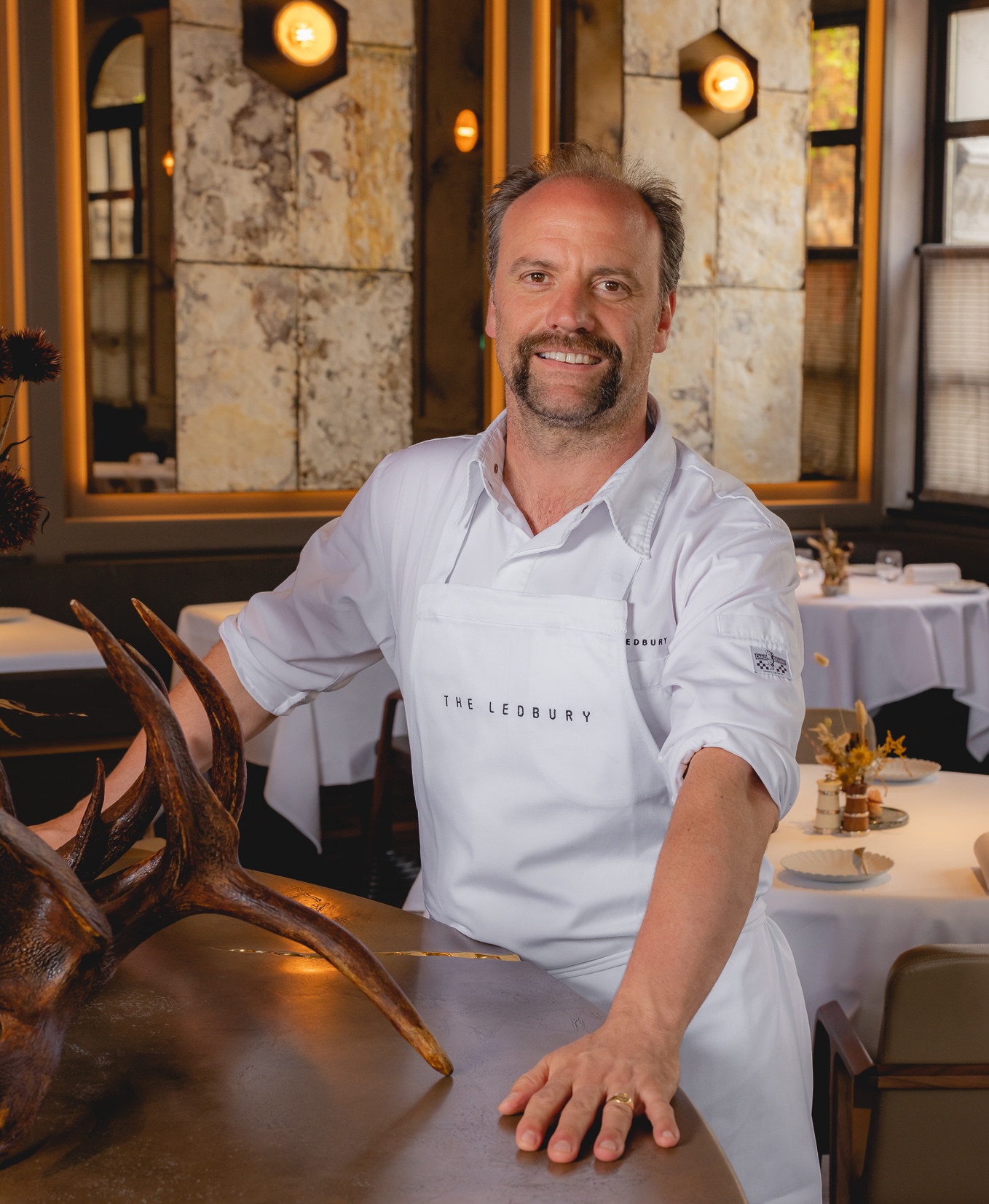
Newcastle-born chef Brett Graham is the mastermind behind triple Michelin-starred restaurant The Ledbury. Picture: Supplied
But after 15 years of being a jewel in the city’s culinary crown, The Ledbury was forced to close its doors during the UK’s 2020 lockdowns — a closure that was extended for almost two years before it finally reopening after a refurbishment in February 2022.
The pandemic hasn’t been the only hurdle for the chef and entrepreneur. “The main challenges here in London have been the rise in the cost of doing business,” he explained. “Minimum wage increases and the rapid rise in cost of ingredients are big issues as the restaurant business is so labour intensive, so this always presents a challenge.”
However, challenges aside, as the lauded eatery celebrates its almost 20 year anniversary it has reached lofty new heights with the recent announcement that it gained a third, coveted Michelin star.
“20 years later after opening I, of course, don’t regret running a business,” said Mr Graham. “But yesterday, when it was minus 3 [degrees], I did have a think about the Australian way of life. I miss family of course and the laid back way of life compared to London.”
When quizzed about future plans for the future, the 45-year-old is justifiably happy with what he’s already achieved.
“I have a pub in Fulham right by Chelsea station called The Harwood Arms, which I’ve been involved in for almost 15 years,” he said. “We also have a farming company which supplies The Ledbury along with other London restaurants. We make charcuteries, oil, keep bees and have almost 3000 animals including Jersey cows, Iberian pigs and deer. Other than that, I have no plans for expansion, just to continue improving, and to try to be a good example to my kids — that’s what matters to me.”



